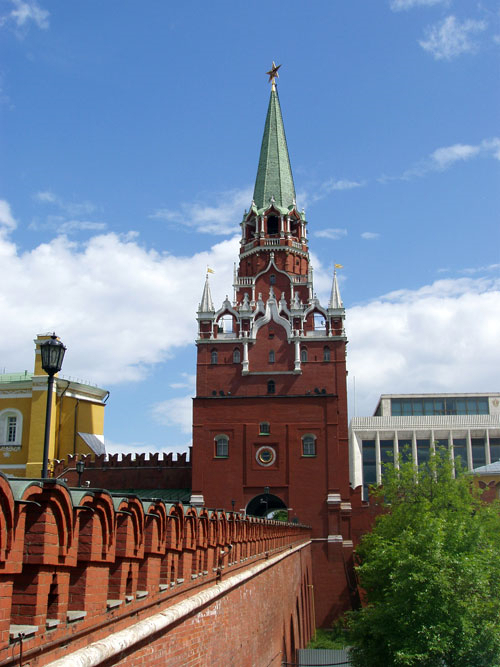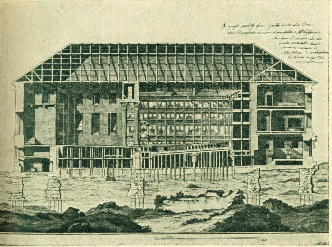|
Anatoly Gunst
Anatoly Ottovich Gunst (Russian: Анатолий Оттович Гунст; 19 November 1858, Moscow - 27 November 1919, Moscow) was a Russian architect, artist, teacher and actor. Biography He was born to a family of Russified Germans from Kazan. His father, , and cousin Alexander Gunst (1862—1938), were also architects. His youngest brother, Yevgeny Gunst, Yevgeny, was a composer and pianist. In 1878, he entered the Moscow School of Painting, Sculpture and Architecture, from which he graduated in 1882. During his studies, he was a construction assistant for the Cathedral of Christ the Saviour, as well as several smaller projects, and taught drawing at the . From 1882 to 1884, he was a teacher at Moscow State School 57. He later took study trips to Austria, Germany and Italy. In 1886, with support from the Rumyantsev Museum, he founded the ; the first private art school in Russia. It offered six-year courses for both men and women. Especially talented students were al ... [...More Info...] [...Related Items...] OR: [Wikipedia] [Google] [Baidu] |
Anatoliy Ott
Anatoly (russian: Анато́лий, Anatólij , uk, Анато́лій, Anatólij ) is a common Russian and Ukrainian male given name, derived from the Greek name ''Anatolios'', meaning "sunrise." Other common Russian transliterations are Anatoliy and Anatoli. The Ukrainian transliteration is Anatoliy or Anatolii. The French version of the name is Anatole (other), Anatole. Other variants are Anatol and more rarely Anatolio. Saint Anatolius of Alexandria was a fifth-century saint who became the first patriarch of Constantinople in 451. Anatoly was one of the five most popular names for baby boys born in St. Petersburg, Russia, in 2004. One in every 35,110 Americans are named Anatoly and the popularity of the name Anatoly is 28.48 people per million. The name of Anatolia – a region located to the east from the Greeks' point of view – shares the same linguistic origin. People * Anatoli Agrofenin (born 1980), Russian footballer * Anatoli Aleksandrovich Grishin (bo ... [...More Info...] [...Related Items...] OR: [Wikipedia] [Google] [Baidu] |
Alexander Yuzhin
Alexander Ivanovich Yuzhin (russian: Алекса́ндр Ива́нович Ю́жин; 1857–1927) was a stage name of the Georgian Prince Sumbatov (Sumbatashvili), who dominated the Malyi Theatre of Moscow at the turn of the 19th and 20th centuries. He was best known for the Romantical parts in the dramas by Schiller and Victor Hugo but also penned a number of plays himself. Yuzhin lived on to become one of the first People's Artists of the Republic in 1922. He was a freemason. Initiated to February 17, 1908 in the masonic lodge A Masonic lodge, often termed a private lodge or constituent lodge, is the basic organisational unit of Freemasonry. It is also commonly used as a term for a building in which such a unit meets. Every new lodge must be warranted or chartered ... "Renaissance" ( Grand Orient of France).Серков А. И. Русское масонство. 1731—2000 гг. Энциклопедический словарь. М.: Российская по� ... [...More Info...] [...Related Items...] OR: [Wikipedia] [Google] [Baidu] |
Russian People Of German Descent
Russian(s) refers to anything related to Russia, including: *Russians (, ''russkiye''), an ethnic group of the East Slavic peoples, primarily living in Russia and neighboring countries * Rossiyane (), Russian language term for all citizens and people of Russia, regardless of ethnicity *Russophone, Russian-speaking person (, ''russkogovoryashchy'', ''russkoyazychny'') * Russian language, the most widely spoken of the Slavic languages *Russian alphabet * Russian cuisine *Russian culture * Russian studies Russian may also refer to: * Russian dressing *''The Russians'', a book by Hedrick Smith * Russian (comics), fictional Marvel Comics supervillain from ''The Punisher'' series * Russian (solitaire), a card game * "Russians" (song), from the album ''The Dream of the Blue Turtles'' by Sting *"Russian", from the album ''Tubular Bells 2003'' by Mike Oldfield *"Russian", from the album '' '' by Caravan Palace * Nik Russian, the perpetrator of a con committed in 2002 *The South African na ... [...More Info...] [...Related Items...] OR: [Wikipedia] [Google] [Baidu] |
Russian Architects
This is a list of architects of the Russian Federation, Soviet Union, Russian Empire, Tsardom of Russia and Grand Duchy of Moscow, both ethnic Russians and people of other ethnicities. This list also includes those who were born in the ///Tsardom of Russia/Grand Duchy of Moscow but later emigrated, and those who were born elsewhere but immigrated to the country and/or worked there for a significant period of time. Attested biographies of architects in Russian history date back to 1475, when Aristotile Fioravanti, a native of Bologna, arrived in Moscow to build the Dormition Cathedral of the Moscow Kremlin. Foreign architects had a notable place in Russian and Soviet history, especially in the last quarter of the 18th century ( Charles Cameron, Bartolomeo Rastrelli, Carlo Rossi and others) and in the first quarter of the 20th century ( Mies van der Roe, Erich Mendelsohn, Ernst May and others). This list includes foreign architects whose primary, and most tangible work material ... [...More Info...] [...Related Items...] OR: [Wikipedia] [Google] [Baidu] |
1919 Deaths
Events January * January 1 ** The Czechoslovak Legions occupy much of the self-proclaimed "free city" of Pressburg (now Bratislava), enforcing its incorporation into the new republic of Czechoslovakia. ** HMY ''Iolaire'' sinks off the coast of the Hebrides; 201 people, mostly servicemen returning home to Lewis and Harris, are killed. * January 2– 22 – Russian Civil War: The Red Army's Caspian-Caucasian Front begins the Northern Caucasus Operation against the White Army, but fails to make progress. * January 3 – The Faisal–Weizmann Agreement is signed by Emir Faisal (representing the Arab Kingdom of Hejaz) and Zionist leader Chaim Weizmann, for Arab–Jewish cooperation in the development of a Jewish homeland in Palestine, and an Arab nation in a large part of the Middle East. * January 5 – In Germany: ** Spartacist uprising in Berlin: The Marxist Spartacus League, with the newly formed Communist Party of Germany and the Independent Social ... [...More Info...] [...Related Items...] OR: [Wikipedia] [Google] [Baidu] |
1858 Births
Events January–March * January – ** Benito Juárez (1806–1872) becomes Liberal President of Mexico. At the same time, conservatives install Félix María Zuloaga (1813–1898) as president. ** William I of Prussia becomes regent for his brother, Frederick William IV, who had suffered a stroke. * January 9 ** British forces finally defeat Rajab Ali Khan of Chittagong ** Anson Jones, the last president of the Republic of Texas, commits suicide. * January 14 – Orsini affair: Felice Orsini and his accomplices fail to assassinate Napoleon III in Paris, but their bombs kill eight and wound 142 people. Because of the involvement of French émigrés living in Britain, there is a brief anti-British feeling in France, but the emperor refuses to support it. * January 25 – The '' Wedding March'' by Felix Mendelssohn becomes a popular wedding recessional, after it is played on this day at the marriage of Queen Victoria's daughter Victoria, Princess Roya ... [...More Info...] [...Related Items...] OR: [Wikipedia] [Google] [Baidu] |
Nikolai Arkharov
Nikolai Petrovich Arkharov (russian: Николай Петрович Архаров, links=no; 7 May 1740 – January 1814) was a Russian chief of police best known for having given his name to the Russian term "arkharovtsy", an ironic appellation of policemen. Biography Nikolai Arkharov came from a noble family. In 1754 he was enrolled at the Guards, in 1756 started the service as soldier of the Preobrazhensky regiment and in 1761 was promoted to officer. His rising began after the mission of 1771 into Moscow, enveloped by the disastrous epidemic of plague and mutiny (known as the Plague Riot), under the direction of Count Grigori Orlov. Count Orlov arrived to Moscow on 26 September 1771 with numerous doctors and four Guards regiments. Arkharov proved himself as energetic and executive officer. Apparently, with the aid of Orlov, with whom he was familiar earlier, Arkharov was transferred into the police with the rank of colonel. After the successfully conducted inquest of ... [...More Info...] [...Related Items...] OR: [Wikipedia] [Google] [Baidu] |
Wiki Prechistenka 16
A wiki ( ) is an online hypertext publication collaboratively edited and managed by its own audience, using a web browser. A typical wiki contains multiple pages for the subjects or scope of the project, and could be either open to the public or limited to use within an organization for maintaining its internal knowledge base. Wikis are enabled by wiki software, otherwise known as wiki engines. A wiki engine, being a form of a content management system, differs from other web-based systems such as blog software, in that the content is created without any defined owner or leader, and wikis have little inherent structure, allowing structure to emerge according to the needs of the users. Wiki engines usually allow content to be written using a simplified markup language and sometimes edited with the help of a rich-text editor. There are dozens of different wiki engines in use, both standalone and part of other software, such as bug tracking systems. Some wiki engines are open ... [...More Info...] [...Related Items...] OR: [Wikipedia] [Google] [Baidu] |
Maly Theatre (Moscow)
Maly Theatre (, literally ''Small Theatre'' as opposed to nearby Bolshoi, or ''Grand'', opera theatre) is a theatre in Moscow, Russia, principally associated with the production of plays. Established in 1806Londre, Margot p. 307 and operating on its present site on the Theatre Square since 1824, the theatre traces its history to the Moscow University drama company, established in 1756. In the 19th century, Maly was "universally recognized in Russia as the leading dramatic theatre of the century", and was the home stage for Mikhail Shchepkin and Maria Yermolova. 40 of Alexander Ostrovsky's 54 plays premiered at Maly, and the theatre was known as The House of Ostrovsky.Londre, Margot p. 306 The Maly Theatre in Moscow and Alexandrinsky Theatre in Saint Petersburg "to a great extent determined the development of Russian theatre during the 19th and 20th century". Maly Theatre positions itself as a traditional drama theatre that produces classical heritage plays. For example, th ... [...More Info...] [...Related Items...] OR: [Wikipedia] [Google] [Baidu] |
Yevgeny Vakhtangov
Yevgeny Bagrationovich Vakhtangov (also spelled Evgeny or Eugene; russian: Евге́ний Багратио́нович Вахта́нгов; 13 February 1883 – 29 May 1922) was a Russian-Armenian actor and theatre director who founded the Vakhtangov Theatre. He was a friend and mentor of Michael Chekhov.Martin BanhamThe Cambridge guide to theatre Cambridge University Press, 1995, p. 1157:"''Armenian born, Vakhtangov studied law at Moscow University before enrolling at A. I. Adashev’s drama school, where he was taught by, among others, Leopold Sulerzhitsky''." He is known for his distinctive style of theatre, his most notable production being ''Princess Turandot'' in 1922. Early life and education Vakhtangov was born to an Armenian father and a Russian mother in Vladikavkaz, Northern Ossetia. He was educated at Moscow State University for a short time before joining the Moscow Art Theatre in 1911. Career Vakhtangov rose in the ranks at the Moscow Art Theatre, and by ... [...More Info...] [...Related Items...] OR: [Wikipedia] [Google] [Baidu] |
Maria Yermolova
Maria Nikolayevna Yermolova (russian: Мария Николаевна Ермолова; in Moscow – 12 March 1928, ''id.'') was a Russian actress, said to be the greatest in the history of the Maly Theatre in Moscow and the first person to be proclaimed the " People's Artist of the Republic" (1921). Career In the course of her 50-year career, Yermolova particularly excelled in the roles which allowed her to "emphasize her independence of spirit and her popular heroism in defiance of corrupt authority", as the Encyclopædia Britannica put it. Her contemporary and fellow Russian actor Constantin Stanislavski proclaimed her the greatest actress he had ever observed, thus placing her above Sarah Bernhardt and Eleonora Duse. From 1889 to 1928 she lived in a house on Tverskoy Boulevard in Moscow. Following her death, her flat was designated a national monument, and the Yermolova Theatre in the Tverskoy District of Moscow still bears her name. A minor planet 3657 Ermolova ... [...More Info...] [...Related Items...] OR: [Wikipedia] [Google] [Baidu] |









